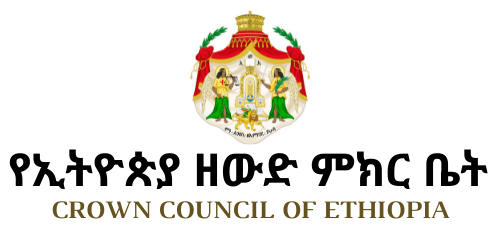The Ethiopian Monarchy today called on all Ethiopians to put aside their political differences to unify in the face of the new military and insurgent threats to the security of the State. Ethiopia’s continued existence as a federal nation-state was now threatened more than at any time since the Italian invasion of 1935, according to Prince Ermias Sahle-Selassie Haile-Selassie, the President of the Crown Council of Ethiopia.
Prince Ermias authorized the release of the statement issued today from the US Legation of the Ethiopian Crown in Exile before he left Washington DC to represent the Ethiopian Crown at the funeral services and mourning period for His Majesty King Hussein in Amman. Prince Ermias said that the State of Ethiopia was ill-equipped to meet the two major military and separatist threats which now faced it.
“Unfortunately, mistakes were made after the removal of the genocidal Dergue administration in 1991,” Prince Ermias said. “The present civil administration in Ethiopia had, after taking power in the name of Tigrean separatism in 1991, divided the country into ethnic enclaves, making it difficult for the country to successfully resist the current external threats. Now, we must come together again, and we must rally around the traditional symbols of Ethiopian unity, including the Crown, which belongs to all Ethiopia’s ethnic and religious communities.”
“The Ethiopian people — representing more than 40 ethnic and linguistic groups — must now pull together to resist the military and political threats being posed by Eritrea and certain Sudanese extremist groups,” Prince Ermias said. “Our first cause must be the preservation of our State; our economic and cultural survival depend on this.”
“It is critical, if we are all to pull together, that the present civil administration in Addis Ababa also commits to the unity of Ethiopia and the reconciliation of its peoples by dramatically improving its record on human rights. This means releasing political prisoners and beginning the process of allowing full political involvement and debate within the society. The administration has said that it wishes the support of all Ethiopians, and to achieve this it must now ensure that all Ethiopians are free from oppression.”
Prince Ermias is the grandson of Emperor Haile Selassie I, and the nephew of Emperor Amha Selassie I. He was named head of the Crown Council of Ethiopia in 1993. The Council advises reigning Emperors and, during any interregnum (such as now), the Council actually represents the 3,000-year-old Solomonic Crown of Ethiopia. No accession to the Throne may be made, according to the Constitution, unless sanctioned by the Crown Council.
“It is inconceivable that Ethiopia, with some 60-million people, cannot resist a military incursion by the Eritrean People’s Liberation Front (EPLF) fighters,” the Prince said. “However, at the same time, we find radical Islamists in Sudan defying the command of the Prophet Mohammed, who specifically forbade Muslims from attacking Ethiopia. Today, the radicals want to break Ethiopia up into a patchwork of small Muslim states, destroying the balanced and harmonious mix of loyal Ethiopian Muslims and Orthodox Christians who have traditionally made Ethiopia an example of religious tolerance.”
“Ethiopia must return to its traditional unifying symbol, the Crown,” Prince Ermias said. “The Crown can and will work with the elected representatives of Ethiopia’s civil administration to ensure that the pride and traditional strengths of our country are restored. The Crown is ready now to work with all Ethiopian civil, military and religious institutions to help strengthen the unity of the State in the face of the most serious threats which now challenge our very survival.”
Prince Ermias, along with the International Strategic Studies Association (ISSA), a Washington-based international NGO, had in October 1998 offered to help mediate a peaceful end to Asmara’s dispute with Ethiopia. “It now seems clear that neither side wished to negotiate an end to the conflict,” the Prince said, “so today we must do all we can to bolster the unity of Ethiopia in order to stave off any threats to the integrity of the State.”
“The continued unity and stability of Ethiopia is vital to the security of the region, to the stable flow of Nile waters to Sudan and Egypt, to the security of the Red Sea sea lanes, and to the overall Middle Eastern peace process.”
“Any aggressors threatening Ethiopia should know that the Crown, with its considerable support among the population of the State and with its widespread international connections, will help rally the defenses of the nation. At the same time, we will continue to fight for the human rights and prosperity of all the inhabitants of Ethiopia, and for the peace and security of the entire region.”








